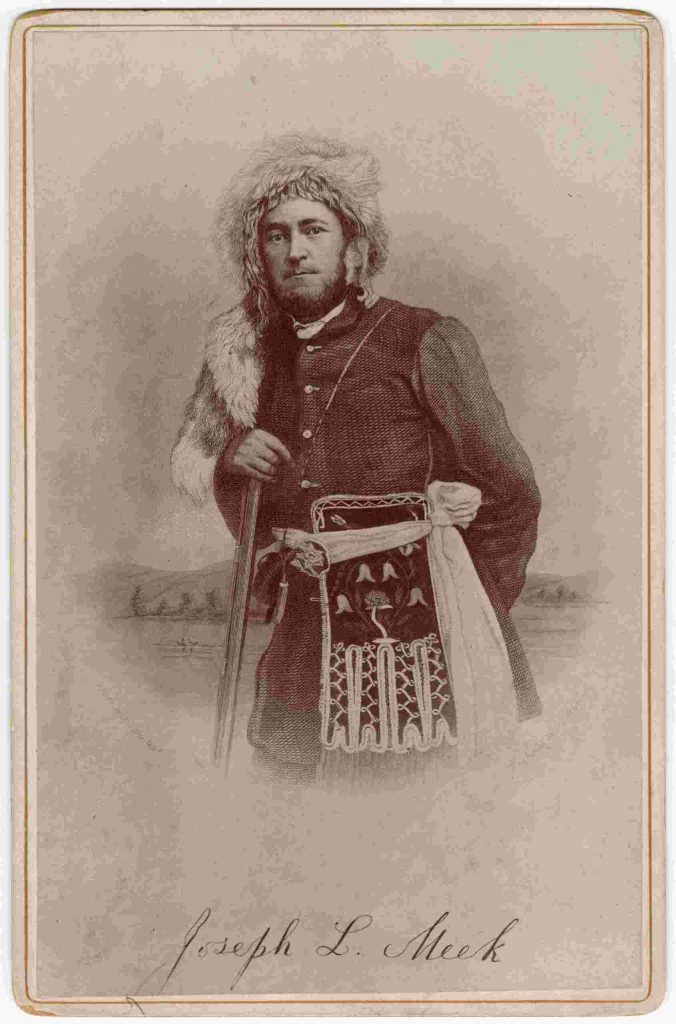
Joseph Lafayette Meek (February 7, 1810 – June 20, 1875) was born in Virginia, then went to Lexington, Missouri, in his teens. There, he signed on with the Smith, Jackson & Sublette Fur Company and left for the Rocky Mountains under William Sublette on March 17, 1829. He spent eleven years in the mountains, becoming a remarkable woodsman and trapper. He took part in the celebrated Battle of Pierre’s Hole at the end of the summer rendezvous in July 1832. The next year, Joe became a free trapper.
Meek accompanied Joe Walker on his California expedition of 1833-34, returning in the summer of 1834 in time for the rendezvous on Ham’s Fork. After countless adventures during the waning days of the Rocky Mountain fur trade era, Meek and his Nez Perce wife, Virginia, relocated to the Willamette Valley, Oregon, on December 15, 1840. Meek had taken part in countless adventures, typically exhibiting a carefree good humor that built a lasting reputation.

In Oregon country, Meek worked for various farms, eventually becoming sheriff, the first law enforcement officer of the new Provisional Government. By 1845, he was a successful prosperous farmer on his own and won a seat in the Legislature.
When he learned of the massacre of the Whitmans, Meek and others took news of the disaster to the States, reaching St. Joseph, Missouri, on May 11, 1848, then on to Washington City by May 28. There Meek greeted his cousin, Mrs. James Polk and her husband, the President. By mid-August, Oregon was made a Territory, and Meek was appointed its marshal.
On his return to Oregon, Meek became more involved in political affairs in the Territory, complicated by growing anti-Indian hysteria. He served in the Yakima Indian War in the Oregon Volunteers, advancing to the rank of major. Meek’s children, being of mixed ancestry, felt the anti-Indian emotionalism of the time, but Joe weathered it all, remaining himself to the end, a man of great accomplishment.
Joe was known for telling fantastic stories of his time in the mountains. He told of shooting Indians merely for amusement or because they looked as if they were about to steal from his traps. He bragged he could even outlie the Crows. Tales of fighting bears and of holiday sprees with free-flowing alcohol spilled from his storied lips. Most of all, Meek had learned to stay alive in the Rockies and reports of his narrow escapes tickled the ears of those who would listen.
One of those who became enamored with his stories was Frances Fuller Victor. The two met in 1866. Victor wrote “I first encountered in the fertile plains of Western Oregon … a man fifty-eight years of age, of fine appearance and buoyant temper, full of anecdote, and with a memory well stored with personal recollections of all the men of note who have formerly visited the old Oregon Territory.” After weeks of interviews, she told Joe’s “tale as twas told to me,” and published Meek’s memoirs as The River of the West in 1870.
From Victor’s efforts, modern historians can learn straight from Joe Meek just how beaver were trapped during the rendezvous period. First-hand accounts of several of those summer fur fairs are laid out in grand detail. Survival in starving times by eating ants and drinking a mule’s blood, traveling miles upon mile driving a pack train, getting lost in today’s Yellowstone National Park, and how bison were hunted are all described by a man who had done it. The wealth of history and details about life as a mountain man unfolds as Meek tells his life story.
Meek spent his last years giving lectures and promoting his book. Worn down by old age, legal problems, and book tours, he died at his home near Hillsboro, Oregon, in June 1875, at the age of 65 years. He and his wife, who outlived him by 25 years, are both buried in the cemetery of the Tualatin Plains Episcopal Church, just north of the town.
RECOMMENDED READING
Francis Fuller Victor, River of the West (Hartford, CT: R. W. Bliss, 1870).
Stanley Vestal, Joe Meek: The Merry Mountain Man (Caldwell, ID: Caxton Printers, 1952). Buy now.
Harvey E. Tobie, “Joseph L. Meek,” in Mountain Men and the Fur Trade of the Far West, LeRoy R. Hafen, ed., 10 vols. (Glendale, CA: Arthur H. Clark Co., 1966), 1:313-335.
